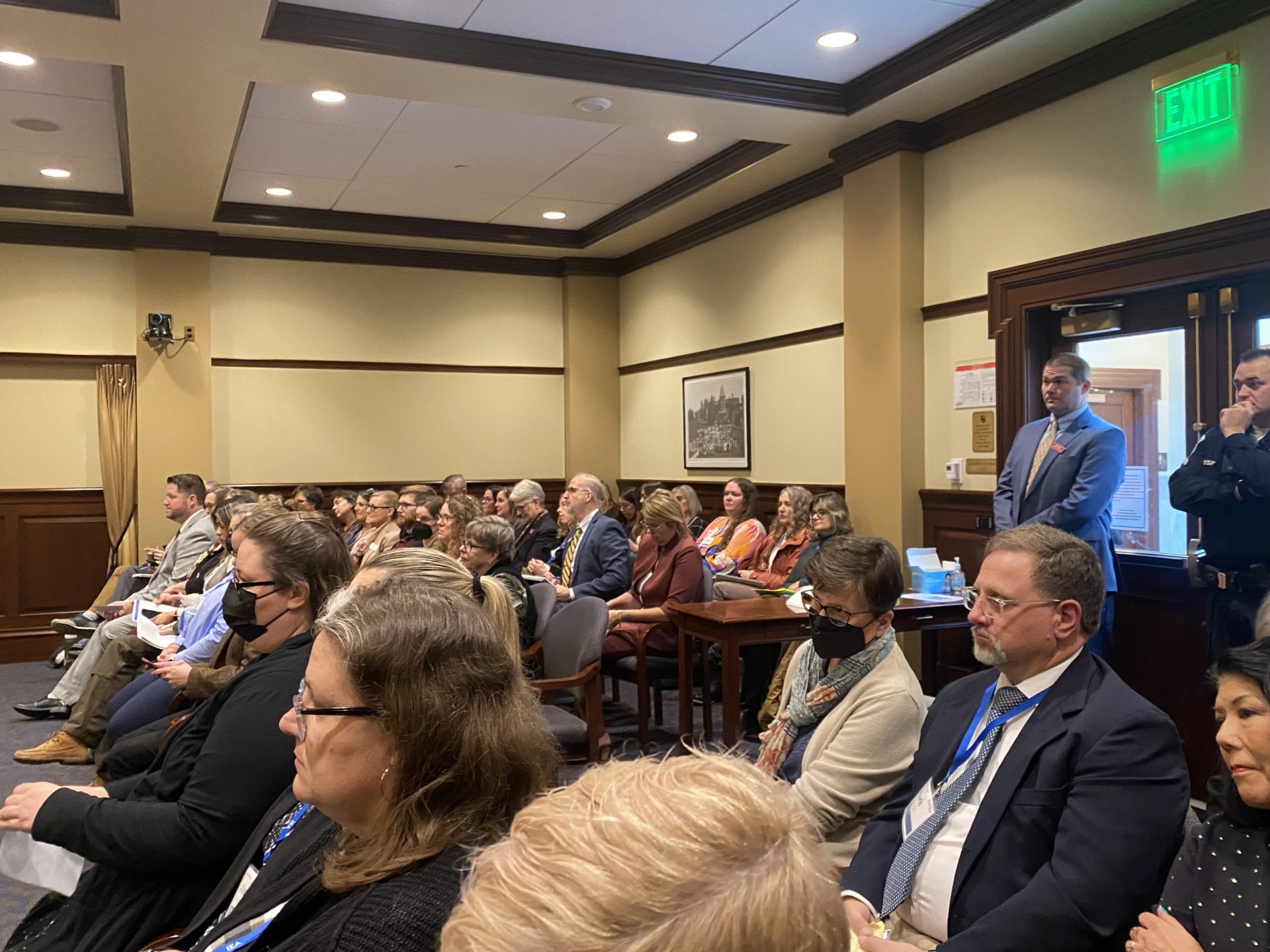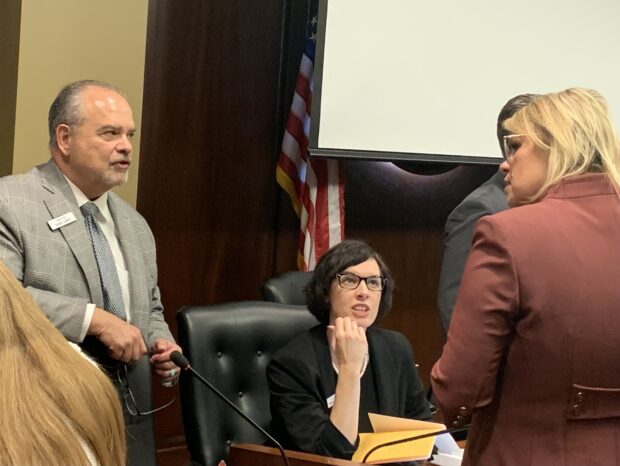On Monday, two of Idaho’s top education leaders spelled out their 2023 goals — boosting college “go-on” rates, examining parent-school relationships and improving literacy rates.
In a pair of presentations — before the House Education Committee in the morning, and the Senate Education Committee in the afternoon — state superintendent Debbie Critchfield and State Board of Education President Kurt Liebich outlined their priorities and fielded a few pointed questions from legislators.
The presentations came at the start of the second week of the session, as committee work began to pick up in earnest. House Education held its first full meeting Monday, after a brief organizational session last week. Senate Education held its debut meeting Monday. Both committees are likely to continue with orientation meetings through the week.


Liebich talked higher education. Idaho’s dipping go-on rate, he said, is a top concern.
Fewer Idaho students are going to college immediately after high school now compared to before the pandemic hit. The 2021 go-on rate dropped to 37%, down from 46% in 2019. The state’s goal is for 60% of young adults to complete a postsecondary program, whether it’s community college, a four-year university or a career-technical education program.
Reducing barriers for students who want to pursue postsecondary education, Liebich said, is key to reaching that goal.
“We know the No. 1 barrier to students going on to post secondary opportunities is access and affordability,” Liebich told House Education. “I think that needs to be a key part of what we talk about.”
Critchfield focused on her K-12 concerns, which she said reflect conversations she’s had with educators, parents, stakeholders, students, administrators and lawmakers across the state.
Improving literacy and math rates — specifically by resourcing teachers and classrooms — topped the new superintendent’s list.
And behavioral health is now “the pandemic we are in,” Critchfield told Senate Education. Examining the role of schools, parents, teachers and counselors in handling behavioral health crises among students will be crucial in the upcoming years.
Critchfield also touched on parent-school relationships; communication between districts, the State Department of Education and lawmakers; and enhancing career-technical tracks across the state.
“We’ve got a long list, but we are actively pursuing it, and we’re excited to be in this position to move forward.”
In both committees, Critchfield fielded questions about the looming topic of education savings accounts — which could provide scholarships for families to cover a range of education costs, including private school tuition and fees. Some lawmakers and school choice proponents advocate for ESAs as a way to enhance education freedom, while many public school advocates and statewide education organizations say such a program is unconstitutional, and would cripple public schools by diverting funding. Opponents say an ESA is fundamentally the same as a voucher program, which directly shifts public dollars into private schools.
The House Education Committee rejected an ESA bill in 2022, but the topic is likely to resurface in 2023.

“There is no support for vouchers, or something that would would take away from our public schools,” Critchfield told Rep. Dale Hawkins, R-Fernwood. “I can’t get on board.”
Asking specifically about what she called “true education savings accounts,” Sen. Tammy Nichols, R-Middleton, received a similar response. Critchfield again said she would oppose a diversion of public dollars into private education. “I want public schools to be a school of choice,” Critchfield said.
But Critchfield said she is not against school choice. Her goal, she said, is to show families the options Idaho already provides, and open up other avenues, like the popular Empowering Parents grant program.
Former superintendent’s candidate joins Freedom Foundation
While Critchfield was making the rounds at the Statehouse Monday, one of her political adversaries landed a job with a hardline think tank that is pushing for school choice.
The Idaho Freedom Foundation named Branden Durst its senior analyst for education policy research.
Durst, a former Democratic state legislator, ran as a conservative Republican in the 2022 state superintendent’s race, finishing second to Critchfield in the May GOP primary.
Durst’s hire comes as the Statehouse debate over private school funding intensifies. The Freedom Foundation has advocated for education savings accounts, which would allow parents to siphon taxpayer dollars into private school tuition. In a tweet Monday — sent out hours after announcing Durst’s hire — the foundation said Critchfield’s comments to House Education demonstrate she is “firmly against education choice.”
It appears to be Durst’s second job move in six months. In July, Durst took a part-time job as senior public policy fellow with the Idaho Family Policy Center, a conservative Christian lobbying group. Durst does not appear on a center web page, listing current staff members.
IEA president: Members are ‘excited’ about funding prospects
Idaho Education Association members packed the House and Senate education committees Monday — with more than 160 members in Boise for a day of lobbying.
And union members are “excited” about 2023, IEA President Layne McInelly told Senate Education members.
Teachers could be in line for across-the-board pay raises this year, in the range of about $6,300 per teacher. Starting teacher salaries could increase to $47,477. Gov. Brad Little recommended the $145.6 million plans for pay raises last week. The pay raises are the largest line item Little is seeking from the $410 million in new education funding earmarked by lawmakers in September.
The infusion of money from September’s one-day legislative session “respresents the respect our educators deserve,” McInelly said.
A key committee gets a property tax primer
A pivotal committee started looking at the basics of what figures to be the toughest tax issue of the 2023 session: property taxes.
The House Revenue and Taxation Committee spent part of its Monday meeting going over the basics of property taxes — specifically, where property taxes come from, and where they go.
In 2021, Idahoans paid slightly more than $2.1 billion in property taxes. Nearly half — some $998 million — came from owner-occupied residential property, said Kolby Reddish, an attorney with the Legislative Services Office. By comparison, commercial and industrial properties accounted for $494 million in taxes.
Meanwhile, schools received about 28% of property taxes collected, Reddish said. Cities and counties received about 27% apiece.
Rev and Tax didn’t get into the details of what a property tax bill could look like. But since all tax bills must start in the House, Rev and Tax will be in the driver’s seat when this debate begins in earnest.
Last week, Gov. Brad Little earmarked $120 million for some form of property tax relief. He didn’t propose a specific approach, deferring instead to legislators.
Idaho EdNews reporter Kevin Richert contributed to this report.
